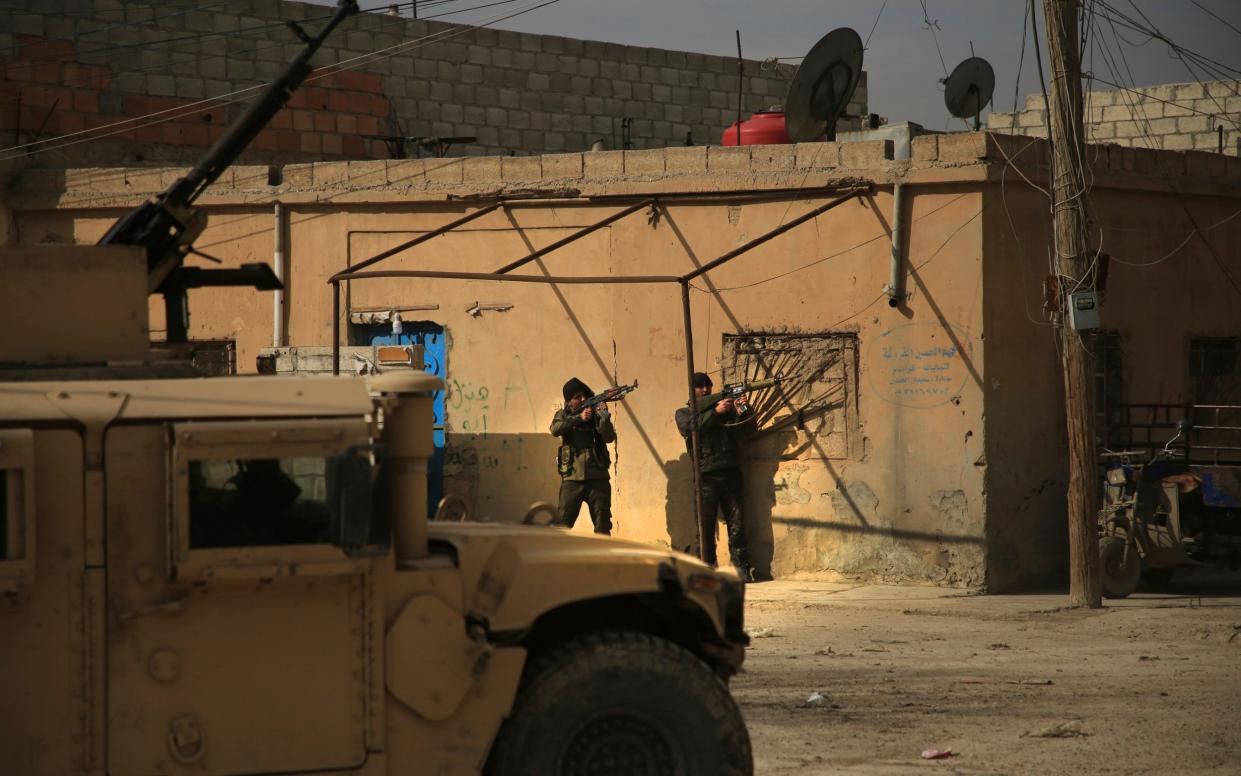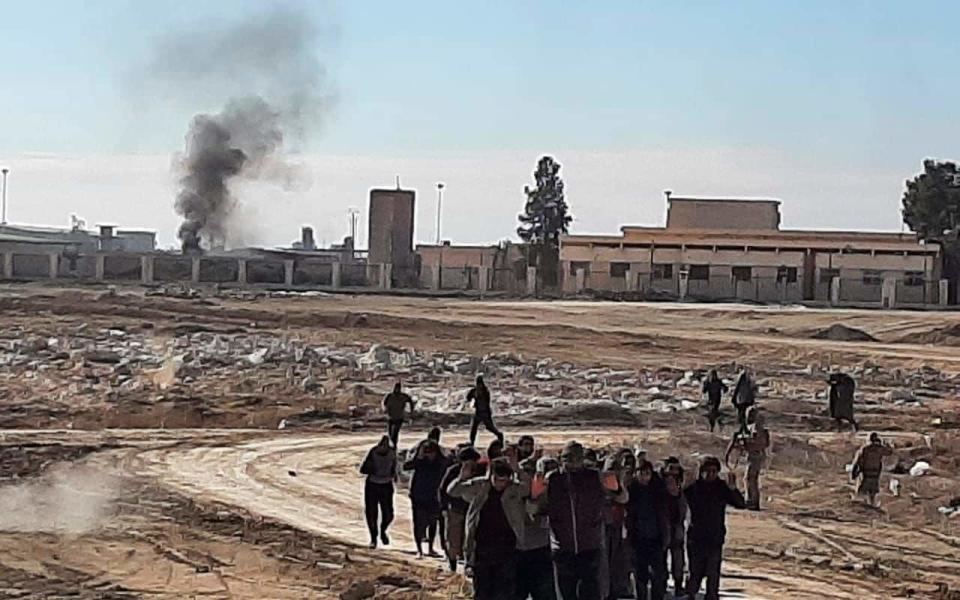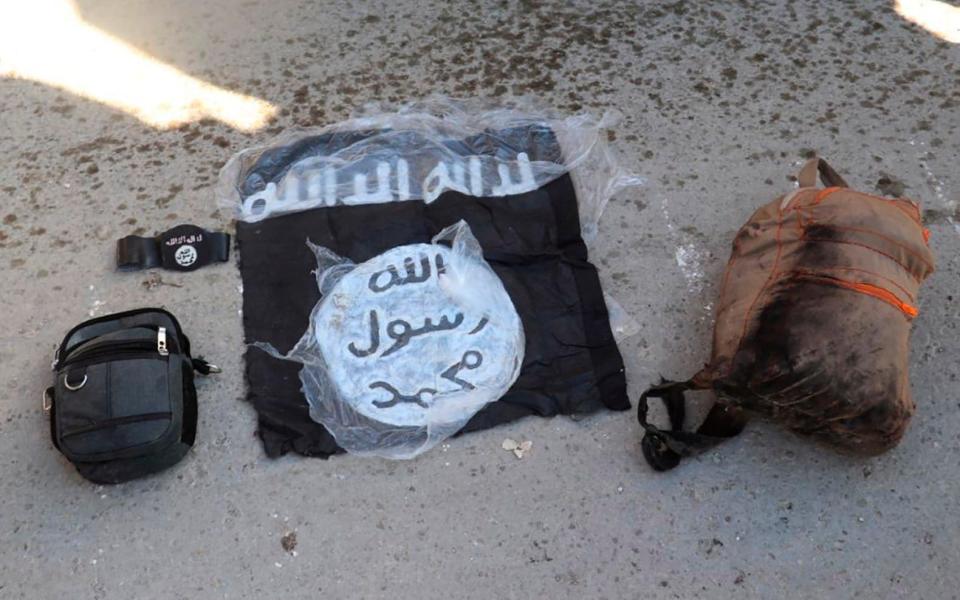Australian teenager caught in Islamic State prison siege begs for help

An Australian teenager trapped in a Syrian prison overrun by Islamic State fighters has begged for help in a series of heart-wrenching messages, saying he fears he will die like other children around him amid the jihadist uprising.
“There's a lot of people dead in front of me, I'm scared I might die any time because I'm bleeding, please help me,” the boy said in voice notes sent to relatives in Australia.
The 17-year-old boy is detained in Gweiran prison in the northeastern city of Hassakeh, which was targeted in a sophisticated jailbreak attack by an estimated 100 IS fighters on Thursday.
Militants detonated several suicide vehicle bombs and breached the prison’s walls, freeing an unknown number of prisoners. Some escaped while others seized weapons and remain holed up inside the jail.

Clashes have continued for days and on Monday IS militants were in control of the “children’s section” of the prison holding hundreds of minors hostage, a spokesman for the Kurdish-led force in charge of Gweiran told The Telegraph.
The prison is the main facility for Islamic State suspects in Kurdish-controlled northeast Syria, holding more than 3,000 inmates from dozens of countries, including an estimated 10 British citizens and 700 children.
Some of those children have died in the fighting, said the Australian teenager, whose name is being withheld due to his age.
“I've seen a lot of bodies of kids, eight years, 10 years, 12 years. My friends got killed here. I'm by myself, I'm very scared, there's a lot of people dead, a lot of people injured,” he said.
His frantic voice notes gave the first news of children in the prison since the attack began and were obtained by The Telegraph as fighters from the Western-backed Syrian Democratic Forces were closing in on the last wing of the prison controlled by militants.
“People are screaming next to me, people are scared. I really need help, I really want to come back home. Please help me,” said the boy, who said he had been wounded in the head and hand by an “Apache” helicopter, after the US-led coalition against IS carried out strikes.
The boy has been detained at Gweiran since 2019, when he was separated from his mother after surrendering to SDF fighters during the final fighting against IS around Baghouz, according to Kamalle Dabboussy, an advocate for Australians detained in northeast Syria.
None of the children detained at Gweiran have been charged with a crime, though SDF officials say some of them were child soldiers.
Mr Dabboussy asked that Australia repatriate the boy, saying he was never involved in fighting after being taken to Syria aged 11 or 12.
“We’ve been advocating for him intensely for three years, the Australian government knew very well that he was there and that he needed assistance,” said Mr Dabboussy.
“He should not be in a men’s prison, he should not be in that part of the world, he should be brought home,” he added.
The Australian Department of Foreign Affairs and Trade did not immediately respond to a request for comment.

Meanwhile a British man who said he worried his brother may have been killed in the prison called on the Government to repatriate British citizens from northeast Syria.
“Not doing anything is not solving the problem and there’s just the risk of things getting worse, ISIS might re-establish themselves,” said the man, who asked to withhold his identity for fear of backlash against his family.
“The Government needs to give the British citizens safety and their rights and bring them back,” he said, adding that his brother was a pharmacist who had travelled to Syria to provide humanitarian care and had never been an IS fighter.
“If someone says he’s lying, well that’s the job of the British justice system to come to that conclusion,” said the man.
The prison attack has highlighted how the unresolved status of IS suspects remains a festering issue more than three years after the group's territorial defeat, according to former MI6 counter-terrorism director Richard Barrett, who said it was important to distinguish between dangerous prisoners and those who were in Syria for other reasons.
“You need to dis-aggregate this group, some of them will be dangerous and would go on to commit other crimes but I don’t think the fact that they were in northeast Syria and were picked up by the SDF is in itself a sufficient charge to hold them without any due process,” he told The Telegraph.
“Due process is very important, we’re trying to distinguish our society from that offered by the Islamic State,” he said. “Surely the rights of the individual, including the right to a hearing if they’re charged with a crime, is fundamental to that.”
Leaving British citizens in Syria does not necessarily make the UK a safer place, he said. “These people have family, friends and community in the UK and I’m afraid that what happens over there has reverberations over here.”
Humanitarian groups have also renewed calls for governments to repatriate their citizens.
“All foreign children must be repatriated – with their families – without any further delay,” said Save the Children’s Syria country director Sonia Khush. “The international community cannot have the blood of any of these children on their hands.”
The SDF said about 27 of its fighters had been killed in fighting around the prison, while an estimated 180 militants had died.
With some militants believed to be holed up in residential areas around the prison, authorities announced a week-long curfew in Hassakeh, where the United Nations said thousands of civilians had fled their homes due to the fighting.
SDF-run prisons in northeast Syria hold about 12,000 men and boys suspected of links to IS, including several thousand foreigners, according to Human Rights Watch. Two detention camps hold a further 60,000 mostly women and children affiliated with the group.


